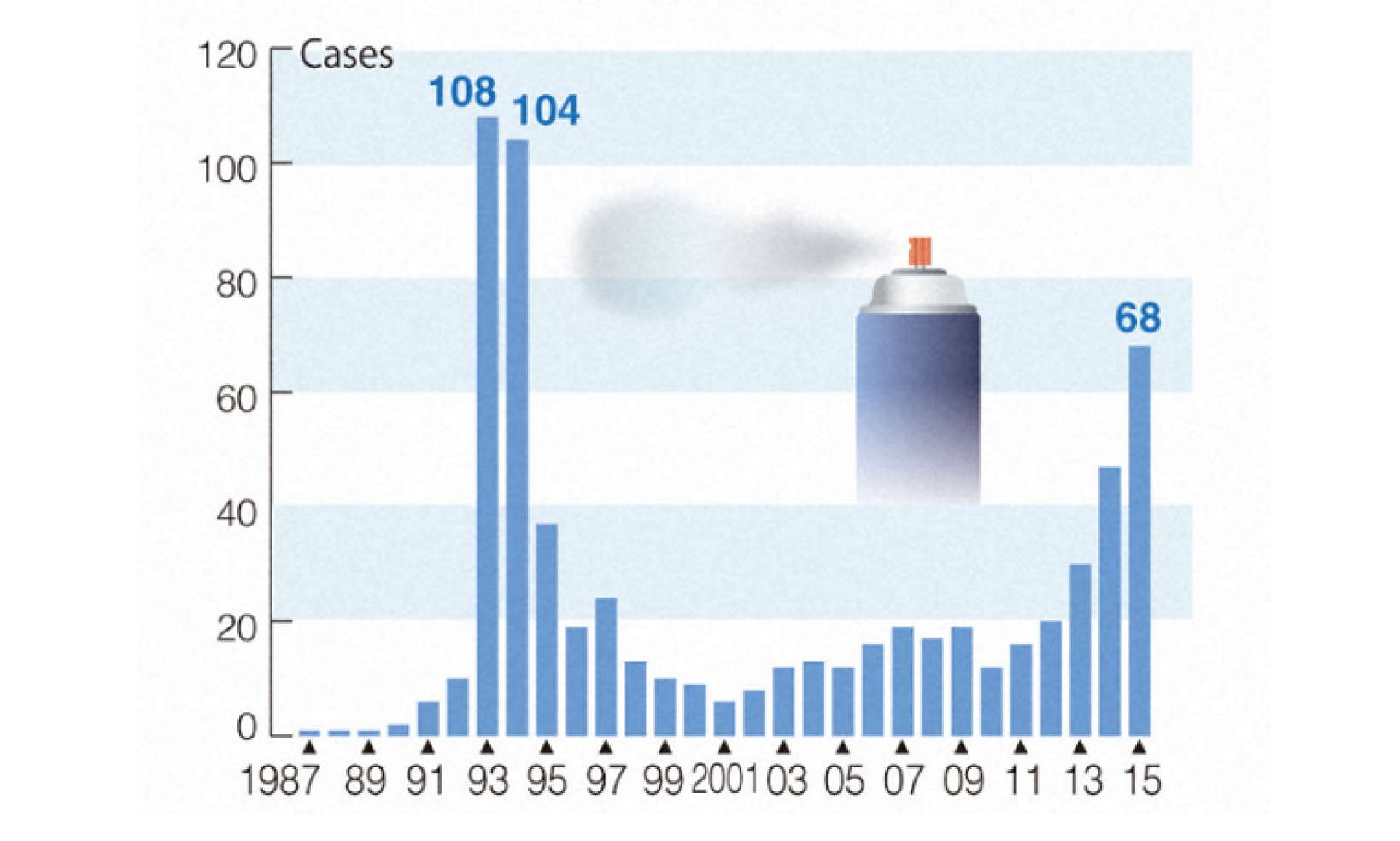 Emergency calls related to waterproofing spray poisoning
Emergency calls related to waterproofing spray poisoning
Waterproofing spray misuse sparks warnings amid rise in breathing complaints
TOKYO - The Japan Poison Information Center is advising people to take care when using waterproofing spray, due to an increase in cases of lung inflammation and breathing difficulties associated with their use.The warnings come as many people see such sprays as an invaluable ally during the rainy season.
In one case recorded by the Tokyo Metropolitan Comprehensive Consumer Center in 2016, a resident in their 20s told the center they had developed a fever and difficulty breathing after using waterproofing spray on their shoes. The person had been standing at the entrance to their home with a ventilation fan running at the time. After being diagnosed with hypersensitivity pneumonitis (HP), the resident was said to have been admitted to hospital for nine days.
According to the Japan Poison Information Center and other bodies, the sprays work by applying a thin film of water-repellent resins to various materials. It is thought that if the spray is inhaled, the chemicals in it can cause irritation, and the resins can cling to the lungs, causing breathing and other difficulties.
The center's emergency poison information service number received its most calls regarding the sprays during the skiing boom in 1993 and 1994, recording over 100 cases in both years.
As the government and manufacturers introduced measures to make the spread of sprayed particles more difficult, the number of calls fell to a low of six in 2001. But the number of cases gradually climbed again, ballooning to 68 cases in 2015."A greater variety of the products, such as for clothes and leather goods, have entered the market. So it's probably down to there being more opportunities to use them," a center representative speculated.
Analysis of 66 of the 68 calls the center received regarding waterproofing sprays in 2015 showed the greatest number was recorded in June, the height of the summer rainy season, with nine incidences. July came second with eight. Some 40 cases, or 61%, were said to have taken place indoors or in a vehicle.
The center's warnings when using waterproofing sprays advise people to wear a mask and administer them outdoors in an area with good air circulation. It also urges users to confirm no one else is in their immediate vicinity, particularly children, when using the sprays.
Source: https://mainichi.jp/english/articles/20190708/p2a/00m/0na/002000c
 English
English Japan
Japan

lasix during pregnancy lasix 40 mg iv why is lasix pushed over 2 minutes what is the half life of lasix
sildenafil citrate tab 20mg sildenafil vs viagra vs cialis what does viagra do free male enhancement products most effective erectile dysfunction pills
provigil vs concerta modafinil online australia is it legal to buy modafinil online how to write an appeal letter to medical insurance company for modafinil
lasix medicine furosemide mexico why take potassium with lasix what is furosemide 20mg
low dose cialis benefits roman viagra free grocery coupons printable 2017 natural viagra ingredients walmart four dollar list 2017 pfizer viagra international pharmacies that ship to the usa sildenafil citrate 100 mg side effects 10 mg cialis for bph viagra professional 100 mg reviews female viagra herbs that are stimulants to humans viagra hardness scale viagra pills female viagra fda gnc women's supplements gnc ed products what increases female libido buy viagra how to make cialis work better $2 off walgreens passport photo figral 50 mg viagra online cheapest price for trulicity oros technology concerta viagra connect prescription drug patient assistance programs vitamins for sexual benefits for women viagra cost at walmart pharmacy natural viagra walgreens pharmacy coupons new prescription
albuterol directions ventolin online canada do you need a prescription for albuterol what is the dosage for ventolin inhaler
ventolin inhaler coupons what is ventolin made out of ventolin inhaler directions use how often
ivermectin dose cats stromectol for humans ivermectin wormer dosage for dogs how much ivermectin for chickens
levitra with dapoxetine priligy buy on usa where can i get dapoxetine
neurontin 400mg can neurontin cause stomach bloating what is the shelf life of gabapentin
prednisone heart palpitations prednisolone prednisone prednisone and covid-19 what is prednisone used for?
plaquenil headache hydroxychloroquine 700mg plaquenil side effects when stopping what side effects does plaquenil have on your teeth
neurontin metallic taste neurontin 400 mg price is there withdrawal from neurontin what vitamins does gabapentin deplete
ivermectin for kids ivermectin cream uk ivermectin oral 3mg for humans how to administer ivermectin as a dip
10 mg cialis reaction time blue and red pills in the matrix how does viagra work supplement for cialis foods that increase libido in women cost of viagra at costco
300 mg neurontin neurontin 400 neurontin is it a narcotic what is the max dose of gabapentin
viagra spray product extenze dosage instructions walmart viagra cialis duration of action does cvs honor goodrx coupons cialis 30 day sample
prednisone definition prednisone medicine how long is prednisone good for what are the benefits of taking prednisone?
neurontin 100 mg gabapentin for sale can neurontin cause muscle pain where can i buy gabapentin for dogs
viagra action viagra recipes vgr 100 side effects viagra meaning diet supplement powder fresenius lawsuit settlement update over the counter erectile dysfunction pills